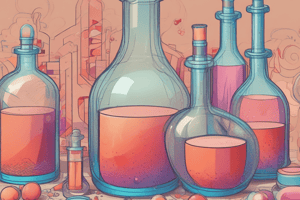Podcast
Questions and Answers
What is the primary focus of rheology in pharmaceutics?
What is the primary focus of rheology in pharmaceutics?
- Optimizing the packaging of pharmaceutical products
- Developing new pharmaceutical manufacturing technologies
- Understanding the chemical properties of pharmaceutical products
- Studying the flow and deformation of pharmaceutical materials (correct)
Which type of rheological behavior is characterized by a decrease in viscosity with increasing shear rate?
Which type of rheological behavior is characterized by a decrease in viscosity with increasing shear rate?
- Pseudoplastic behavior (correct)
- Dilatant behavior
- Newtonian behavior
- Non-Newtonian behavior
What is the measure of a material's ability to return to its original shape after stress is removed?
What is the measure of a material's ability to return to its original shape after stress is removed?
- Thixotropy
- Viscosity
- Plasticity
- Elasticity (correct)
Which rheological test measures the stress relaxation and recovery of materials?
Which rheological test measures the stress relaxation and recovery of materials?
What is the primary application of rheology in formulation development?
What is the primary application of rheology in formulation development?
Which instrument is used to measure the viscoelastic properties of pharmaceutical materials?
Which instrument is used to measure the viscoelastic properties of pharmaceutical materials?
What is the primary advantage of using rheology in quality control?
What is the primary advantage of using rheology in quality control?
Which type of rheological behavior is characterized by a decrease in viscosity over time under constant shear rate?
Which type of rheological behavior is characterized by a decrease in viscosity over time under constant shear rate?
Flashcards are hidden until you start studying
Study Notes
Definition and Importance of Rheology in Pharmaceutics
- Rheology is the study of the flow and deformation of materials, including their mechanical properties and behavior under stress.
- In pharmaceutics, rheology is crucial for understanding the physical and chemical properties of pharmaceutical products, such as suspensions, emulsions, and gels.
Types of Rheological Behavior
- Newtonian behavior: Viscosity remains constant with changing shear rate.
- Non-Newtonian behavior: Viscosity changes with changing shear rate.
- Pseudoplastic behavior: Viscosity decreases with increasing shear rate.
- Dilatant behavior: Viscosity increases with increasing shear rate.
- Thixotropic behavior: Viscosity decreases over time under constant shear rate.
Rheological Properties of Pharmaceutical Systems
- Viscosity: Measure of a fluid's resistance to flow.
- Elasticity: Measure of a material's ability to return to its original shape after stress is removed.
- Plasticity: Measure of a material's ability to deform under stress without returning to its original shape.
Rheological Measurements in Pharmaceutics
- Rheometers: Instruments used to measure rheological properties, such as viscometers and dynamic mechanical analyzers.
- Rheological tests:
- Flow curves: Measure viscosity vs. shear rate.
- Creep and recovery tests: Measure stress relaxation and recovery of materials.
- Oscillatory tests: Measure viscoelastic properties under oscillating stress.
Applications of Rheology in Pharmaceutics
- Formulation development: Understanding rheological properties helps optimize formulation composition and processing conditions.
- Product characterization: Rheology helps predict product performance, stability, and shelf life.
- Quality control: Rheological measurements can be used to monitor product consistency and detect deviations.
- Biopharmaceutics: Rheology is important for understanding the behavior of biological fluids and tissues in the body.
Definition and Importance of Rheology in Pharmaceutics
- Rheology is the study of flow and deformation of materials, including their mechanical properties and behavior under stress, crucial for understanding physical and chemical properties of pharmaceutical products.
Types of Rheological Behavior
- Materials exhibit different behaviors under stress, including:
- Newtonian behavior: constant viscosity despite changing shear rate
- Non-Newtonian behavior: changing viscosity with changing shear rate, comprising:
- Pseudoplastic behavior: decreasing viscosity with increasing shear rate
- Dilatant behavior: increasing viscosity with increasing shear rate
- Thixotropic behavior: decreasing viscosity over time under constant shear rate
Rheological Properties of Pharmaceutical Systems
- Key rheological properties of pharmaceutical systems include:
- Viscosity: measure of a fluid's resistance to flow
- Elasticity: measure of a material's ability to return to original shape after stress removal
- Plasticity: measure of a material's ability to deform under stress without returning to original shape
Rheological Measurements in Pharmaceutics
- Rheological measurements are made using:
- Rheometers: instruments like viscometers and dynamic mechanical analyzers
- Rheological tests, including:
- Flow curves: measuring viscosity vs. shear rate
- Creep and recovery tests: measuring stress relaxation and recovery of materials
- Oscillatory tests: measuring viscoelastic properties under oscillating stress
Applications of Rheology in Pharmaceutics
- Rheology has various applications in pharmaceutics, including:
- Formulation development: optimizing formulation composition and processing conditions
- Product characterization: predicting product performance, stability, and shelf life
- Quality control: monitoring product consistency and detecting deviations
- Biopharmaceutics: understanding behavior of biological fluids and tissues in the body
Studying That Suits You
Use AI to generate personalized quizzes and flashcards to suit your learning preferences.




